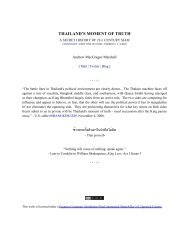THAILAND'S MOMENT OF TRUTH - ZENJOURNALIST
THAILAND'S MOMENT OF TRUTH - ZENJOURNALIST
THAILAND'S MOMENT OF TRUTH - ZENJOURNALIST
Create successful ePaper yourself
Turn your PDF publications into a flip-book with our unique Google optimized e-Paper software.
writing: “Bring my father back and get the government out.”<br />
Sarawut Sathan, 45, who came from Bang Kapi district, said he joined the protest<br />
because he wanted the government to dissolve the House and hold fresh elections as<br />
a way to resolve the crisis in society. Another woman wrote on the road with chalk<br />
that she still remembered the time when her friend was killed four months ago.<br />
Sombat said yesterday's symbolic activity at Rajprasong had succeeded in getting<br />
the government's attention. He said he did not expect that over 10,000 would join the<br />
rally. "We just came here to tell the government that we will never forget," he said.<br />
It was towards the end of the protest that it became clear that everything had changed<br />
for Thailand’s monarchy. The crowd had become so large that it blocked traffic at the<br />
intersection, something Sombat had been anxious to avoid. Because the use of loudspeakers<br />
was banned under the state of emergency, he had difficulty controlling the sea of Red Shirt<br />
protesters, and eventually used borrowed police speakers to implore the crowd to disperse<br />
ahead of schedule, and head towards Wat Pathum for a ceremony there:<br />
If you shut the road, we won’t win. Please think it through… Our fight must go<br />
on. We must end today’s activity. We fight a political fight and we must win it<br />
politically.<br />
But most people refused to listen. A chant rose up among the crowd: “I came by myself.”<br />
They were shouting that they had not come to follow leaders, but under their own volition, to<br />
protest as they chose.<br />
And then, the chant changed. A slogan began to be shouted among one group of protesters<br />
at the intersection and spread through the crowd until hundreds were shouting it over and<br />
over again. It was a denunciation, using a Thai insult that literally means “monitor lizard”, a<br />
particularly reviled animal; the closest English-language equivalent is probably “bastard”:<br />
The bastard ordered the killing. The bastard ordered the killing.<br />
It was a stunning moment, an event most Thais never dreamed would come to pass. Hundreds<br />
of people gathered in the heart of Thailand’s capital, defiant and angry, were shouting a<br />
deliberately crude insult and inflammatory accusation aimed at an unthinkable target.<br />
“The bastard” was King Rama IX.<br />
- - - - -<br />
Bhumibol was four miles away when it happened, marking his own unhappy anniversary.<br />
As the anger and grief of the crowds at Ratchaprasong over the coup four years before and<br />
the crackdown four months before exploded into an unprecedented public challenge to his<br />
moral authority, Rama IX was at Siriraj on the west bank of the Chao Phraya river. Exactly<br />
a year ago, he had been admitted to the hospital, and he had been resident there ever since,<br />
unwilling or unable to leave even when doctors pronounced him fit to be discharged. In a<br />
radio broadcast in August to mark her birthday, Queen Sirikit insisted her husband was doing<br />
fine:<br />
12<br />
Now his health has substantially improved but doctors still ask him to continue doing<br />
physical therapy so that he can move around with strength first before leaving the<br />
hospital.




